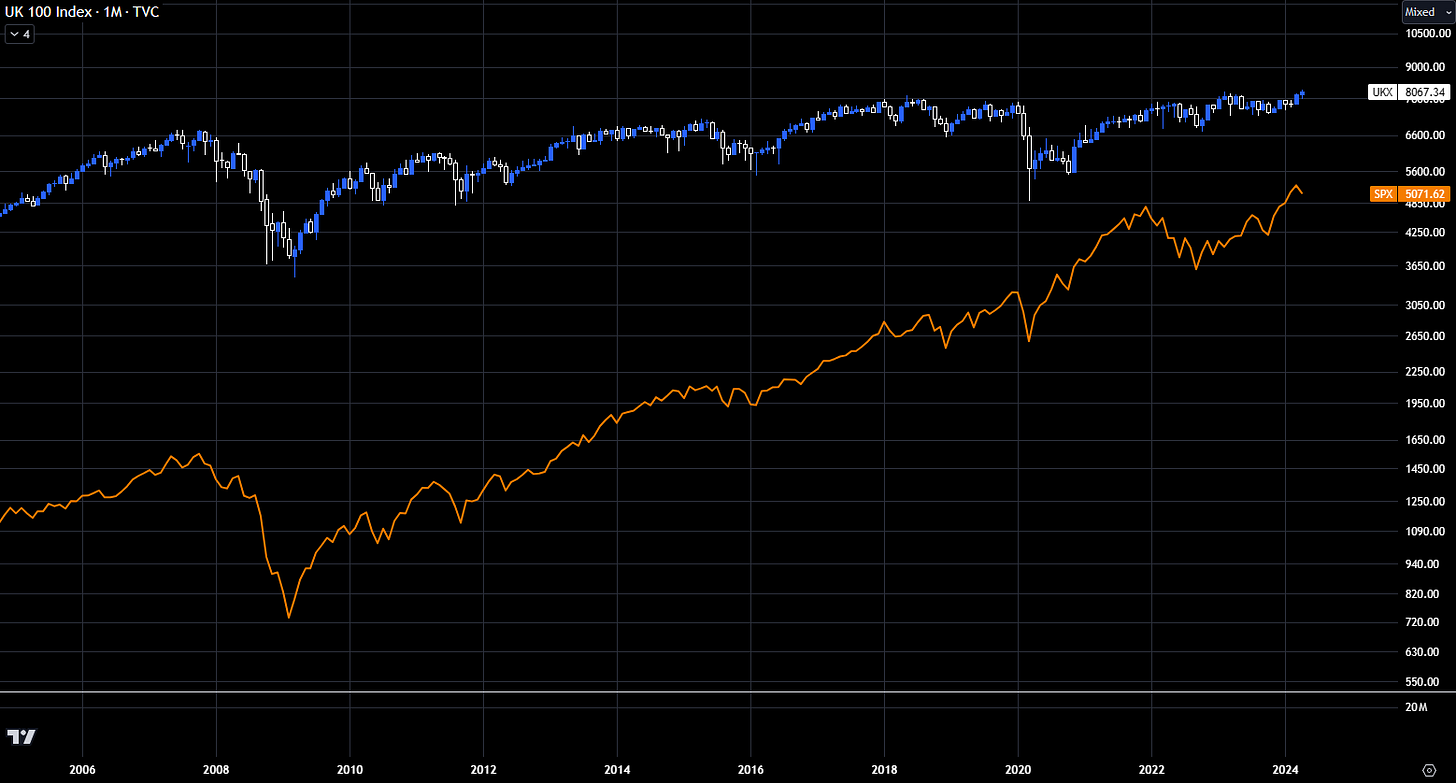Why The FTSE 100 Is Hitting ATHs As The S&P 500 Corrects
In a divergence from across the pond, we flag up the case for undervalued UK equities.
On Monday, the FTSE 100 closed at a fresh all-time high above 8,000 points. It has continued to press higher, touching 8,100 points in trading on Thursday before the US PCE inflation print came out.
The reason this is significant is because of the divergence from performance across the pond with US equities. Over the course of the past week or so while the FTSE 100 has been climbing higher, the S&P 500 has been correcting lower.
When we zoom out, the opposite narrative has been seen (and well reported on). Namely that US indices have been pushing all-time highs for quite some time, while here in the UK it has been very much a stagnant market treading water.
So is this short-term divergence telling us something?
For the rest of this article we’ll run through
Reasons why the FTSE 100 is outperforming right now
Where we see UK equities heading for the rest of the year
Trade ideas to play this theme
At the start of the month we dropped our Q1 portfolio review. We returned 10.74% on capital invested, beating our benchmark by 5.48%. To see what we bought and sold (along with our current holdings), you can subscribe here:
Next week we’ll be dropping an April performance update.
Why the FTSE 100 is doing well
We’re careful to avoid banding together the ‘UK’ and the ‘FTSE 100’. Intrinsically, the companies listed on the FTSE 100 are multi-nationals that have exposure to various countries around the world. Therefore, it’s not correct to say that domestic issues dominate the price action of these companies.
However, it’s true that the index is used as a barometer of economic sentiment for the UK in a more general way.
This speaks to one of the major reasons why we’ve seen divergence vs the US recently…RATE PRICING
Until recently, rates pricing for both nations was carefully moving in lockstep. In Q1, rate cuts were aggressively priced out of the forward curve for both nations.
Yet this has changed, particularly after the stronger than expected PCE inflation print out from the US on Thursday. The recent beats in data can be seen below:
The market is continuing to rapidly price out cuts from the Fed, with now less cuts priced in for the Fed than for the Bank of England.
Further, there’s a 50% chance of a rate cut over here in August, whereas in the US the September meeting only has a 40% chance of a cut.
This divergence is providing a boost for the FTSE 100 as a proxy for investors to express happiness of lower rates in the UK and the benefit that brings. Conversely, the more than strong data comes out of the US, pressure could be kept on the neck of US equity markets.
Granted, this assumes a reaction of ‘bad news is bad news’ which isn’t always the case, but that’s a topic for another day…
A second factor at play is the relative value, with a potential early sign of a pivot towards undervalued UK stocks vs US counterparts.
As part of a recent article put out by Dr Rama Prasad Kanungo of UCL Global Business School, he noted that:
“The valuation differential between both markets is affecting the LSE listing considerably. Earnings for US-listed companies have been consistently growing, at a three-year annualised return of 14%, revenues have grown at 9.1%, and the market trading is levelling at an average price-earnings ratio of 27.6.
In contrast, the five-year annualised return of the LSE (2017-2022) was 3.2% and the revenues growth is projected at 5.4%.
The US market offers a higher valuation for companies, a faster-growing equity market fuelled by AI-led investor pools, and opportunities to make money through short-selling. The UK market traditionally prefers long-term selling stocks which sometimes result in low growth and return.”
This is true, and a key reason why the US markets have outperformed the UK (FTSE 100 and the more domestic FTSE 250) in recent years.
Yet for value investors that have ridden the US markets higher in recent years, we think some have cycled out of high beta tech names and started to increase allocations to the FTSE 100.






